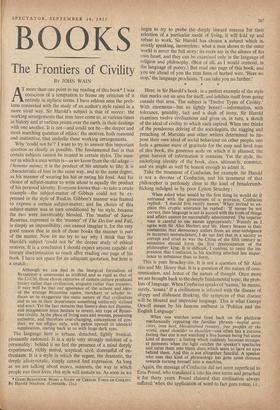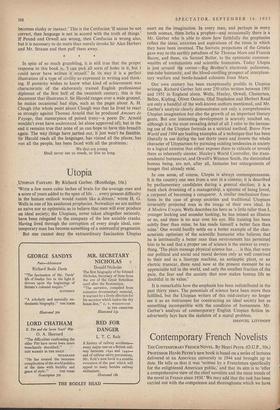BOOKS
The Frontiers of Civility
BY JOHN WAIN TT more than one point in my reading of this book* I was conscious of a temptation to frame my criticism of it entirely in stylistic terms. I have seldom seen the prob- lems connected with the study of an author's style raised in a more vivid way. Sir Harold's subject is that of mores: the working arrangements that men have come to, at various times in history and at various points over the earth, in their dealings with one another. It is not—and could not be—the deeper and more searching question of ethics : the motives, both reasoned and instinctive, that underlie these working arrangements.
Why 'could not be'? I want to try to answer this important question as clearly as possible. The fundamental fact is that certain subjects cannot be treated in certain styles. The man- ner in which a man writes is—as we know from the old adage-- l'homme meme; it is the product of his attitude to life; it is characteristic of him in the same way, and to the same degree, as his manner of wearing his hat or eating his food. And his choice of subject-matter to write about is equally the product of his personal identity. Everyone knows that—to take a crude example—the subject-matter of Gibbon could not be ex- pressed in the style of Ruskin. Gibbon's manner was framed to express a certain subject-matter, and his choice of this subject-matter was in turn conditioned by his style, because the two were inextricably blended. The 'matter' of Sartor Resartus, expressed in the 'manner' of The Decline and Fall, is simply an impossibility; one cannot imagine it, for the very good reason that in each of those books the manner is part of the matter. Now let me try to say why I think that Sir Harold's subject 'could not be' the deeper study • of ethical motives. It is a conclusion I should expect anyone capable of literary discrimination to reach after reading one page of his book. I have not space for an adequate quotation, but here is a snatch : Although we can find in the liturgical formalism of Byzantium a ceremonial as artificial and as rigid as that of the Li-Chi, those eleven centuries of eastern culture produced luxury rather than civilisation, etiquette rather than manners. It may well be that our ignorance of the actions and ideas of the average Byzantine squire, merchant or scholar in- duces us to exaggerate the static nature of that civilisation and to see in their deportment something uniformly stylised and erect. Yet the fict remains that history does not illumine, and imagination must hesitate to invent, any type of Byzan- tine civility. Inithe place of living men and women, possessing authentic, and therefore ever-changing, conceptions of con- duct, we see effigies only, with palms opened in identical supplication, staring back at us with huge dark eyes.
The language here is urbane, detached, lightly ironical, pleasantly cadenced. It is a style very strongly redolent of a personality: behind it we feel the presence of a mind deeply experienced„ richly stored, sceptical, civil, distrustful of en- thusiasm. It is a style in which the urgent, the dramatic, the deeply idiosyncratic, simply cannot find expression. As long as we are talking about mores, manners, the way in which people run their lives, this style will sustain us. As soon as we
• GOOD BEHAVIOUR. BEING A• STUDY OF CERTAIN TYPES OF CIVILITY.
By Harold Nicolson. (Constable, 21s.)
367 begin to try to probe the deeply inward reasons for their selection of a particular mode of living, it will fold up and refuse to work. Sir Harold has chosen a subject which is. strictly, speaking, incomplete: what a man shows to the outer world is never the full story; its roots are in the silence of his own heart, and they can be examined only in the language of religion and philosophy. (Best of all, as I would contend, in the language of poetry.) But read one page of this book, and you see ahead of you the trim lines of barbed wire. 'Here we stop,' the language proclaims. 'I can take you no further.'
• • * Here, in Sir Harold's book, is a perfect example of the style that marks out an area for itself, and inhibits itself from going outside that area. Tha subject is 'Twelve Types of Civility.' With enormous—but so lightly borne ! —information, with tolerance, geniality, tact and a dash of irony, Sir Harold examines twelve civilisations and gives us, in turn, a sketch of the ideal of civility to which each aspired. When one thinks of the ponderous delving of the sociologists, the nagging and preaching of Marxists and other writers determined to im- pose their own ideal of social behaviour on other people, one feels a genuine wave of gratitude for the easy and level tone of this book, the generous scale on which it is planned, the great harvest of information it contains. Yet the style, the underlying identity of the book, does, ultimately, constrict; and we might as well be honest enough to admit it. Take the treatment of Confucius, for example. Sir Harold is not a devotee of Confucius, and his treatment of that philosopher is perilously close to the kind of breadcrumb- flicking indulged in by poor Lytton Strachey : When asked what would be the first thing he would do if entrusted with the government of a province, Confucius replied : 'I should first rectify names.' When invited to ex- plain this cryptic utterance he replied : 'If names be not correct, then labguage is not in accord with the truth of things and affairs cannot, be successfully administered. The superior man is careful to use names appropriately.' Warmly as 1 agree with Sir Alan Herbert and Mr. Henry Strauss in their contention that democracy suffers from an over-indulgence in incorrect nomenclature, I do not feel that in a society as corrupt and cruel as was the China of the fifth century BC semantics should form the first preoccupation of the philosopher king. It is difficult, I confess, to resist the im- pression that Confucius in his teaching attached less impor- tance to substance than to form.
This is pure Strachey-itis. It is not a question of Sir Alan this and Mr. Henry that. It is a question of the nature of com- munication, and hence of the nature of thought. Once more we are brought back to the deeply fundamental topic, the prob- lem of language. When Confucius speaks of 'names,' he means. surely, 'nouns.' If a civilisation is infected with the disease of slqppy and dishonest thinking, the symptom of that disease will be bloated and imprecise language. This is what George Orwell meant by his famous outburst in 'Politics and the English Language' : When one watches some tired hack on the platform mechanically repeating the familiar phrases—bestial atro- cities, iron heel, bloodstained tyranny, free peoples of the world, stand shoulder to shoulder—one often has a curious feeling that one is not watching a live human being but some kind of dummy: a feeling which suddenly becomes stronger at moments when the light catches the speaker's spectacles and turns them into blank discs which seem to have no eyes behind them. And this is. not altogether fanciful. A speaker who uses that kind of phraseology has gone some distance towards turning himself into a machine, Again, the message of Confucius did not -seem superficial to Ezra Pound, who translated it into his own terms and preached it for thirty years. Pound claimed that civilisation always suffered 'when the application of word to fact goes rotten, i.e.,
becomes slushy or inexact.' This is the Confucian 'If names be not correct, then language is not in accord with the truth of things.' If Pound and Orwell are wrong, then Confucius is wrong also, but it is necessary to do more than merely invoke Sir Alan Herbert and Mr. Strauss and then puff them away.
In spite of so much grumbling, it is still true that the proper response to this book is, 'I can pick all sorts of holes in it, but I could never have written it myself.' In its way it is a perfect illustration of a type of civility as expressed in writing and think- ing. If posterity wishes to know what kind of achievement was characteristic of the elaborately trained English professional diplomat of the first half of the twentieth century, this is the document that illustrates it. Sir Harold ranges over a wide ground; he makes occasional bad slips, such as the pages about A. H, Clough (the whole point about Clough was that he lived to react so strongly against Thomas Arnold that he produced Amours de Voyage, that masterpiece of poised irony—a poem Dr. Arnold wouldn't even have understood, let alone approved of); but in the end it remains true that none of us can hope to have this breadth again. The way things have turned out, it just won't be feasible. Sir Harold reads all the languages, has visited all the places, has met all the people, has been faced with all the problems : We that are young
Shall never see so much, or live so long.



































 Previous page
Previous page